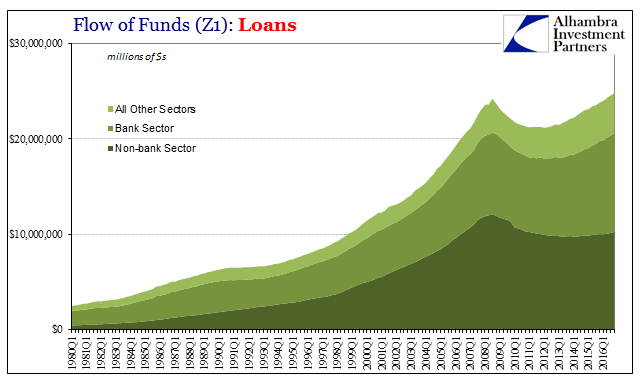It is surely one of the primary reasons why many if not most people have so much trouble accepting the trouble the economy is in. With record high stock prices leading to record levels of household net worth, it seems utterly inconsistent to claim those facts against a US economic depression. Weakness might be more easily believed as some overseas problem, leading to only ideas of decoupling or the US as the “cleanest dirty shirt” – the US economy has problems, but how bad can they be? Yet, despite asset price levels and even record debt, all those prove is just how disconnected those places have become from what used to be an efficient way to redistribute financial resources.
According to the Fed’s Z1 report, Household net worth climbed by $2 trillion in Q4 alone to $92.8 trillion. That is a 69% increase from the low in Q1 2009, even though Final Sales to Domestic Purchasers have grown by just 30% in that same time. The wealth effect is dead, or, more specifically, it never was.


From the view of net worth, the increase to record debt levels seems manageable. From the more appropriate view of income and economy, it does not, even though US debt levels have grown more slowly post-crisis. That would mean debt is partway between assets and economy, sort of splitting the difference of what monetary policy believes and what it, at best, “achieved.”


Total debt (Total Lending plus Total Securities) rose just 0.8% in Q4 2016, the slowest growth rate since Q3 2015. That deceleration was shared equally by loans as well as securities, both registering record highs but also remaining hugely inefficient toward real economic growth and therefore capacity (what is all this debt financing?).

The minimal amount of overall deleveraging after the Great “Recession” has achieved a similarly minimal amount of financial rebalancing debt to economy. Total credit levels have remained historically out of bounds with the capacity to support them. The chart above may provide a clue as to why that has been, especially in contrast to the Great Inflation. The so-called Great Moderation (which clearly wasn’t that) did not moderate the level of credit expansion to economic expansion (in nominal terms) as had been done even throughout the worst parts of the Great Inflation.













Leave A Comment